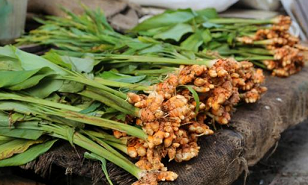Turmeric is a plant. You probably know turmeric as the main spice in curry. It has a warm, bitter taste and is frequently used to flavor or color curry powders, mustards, butters, and cheeses. But the root of turmeric is also used widely to make medicine.
Contents
Uses
Turmeric is used for:
- Arthritis
- Heartburn (dyspepsia)
- Stomach pain
- Diarrhea
- Intestinal gas,
- Stomach bloating
- Loss of appetite
- Jaundice
- Liver problems
- Gallbladder disorders.
- Headaches
- Bronchitis
- Colds
- Lung infections
- Fibromyalgia
- Leprosy
- Fever
- Menstrual problems
- Cancer
- Depression
- Alzheimer’s disease
- Water retention
- Worms
- Kidney problems.
Some people apply turmeric to the skin for:
- Pain
- Ringworm
- Bruising
- Leech bites
- Eye infections
- Inflammatory skin conditions
- Soreness inside of the mouth
- Infected wounds.
- In food and manufacturing, the essential oil of turmeric is used in perfumes, and its resin is used as a flavor and color component in foods.
Don’t confuse turmeric with Javanese turmeric root (Curcuma zedoaria).
Cautions
Turmeric usually does not cause significant side effects; however, some people can experience stomach upset, nausea, dizziness, or diarrhea.
- Don’t take turmeric if you are pregnant.
- There isn’t enough information to rate the safety of turmeric during breast-feeding. It’s best not to use it.
- Gallbladder problems: Turmeric can make gallbladder problems worse. Don’t use turmeric if you have gallstones or a bile duct obstruction.
- Gastroesophageal reflux disease (GERD): Turmeric can cause stomach upset in some people. It might make stomach problems such as GERD worse. Don’t take turmeric if it worsens symptoms of GERD.
- Surgery: Turmeric might slow blood clotting. It might cause extra bleeding during and after surgery. Stop using turmeric at least 2 weeks before a scheduled surgery.
Other Names
Curcuma, Curcuma aromatica, Curcuma domestica, Curcumae longa, Curcumae Longae Rhizoma, Curcumin, Curcumine, Curcuminoid, Curcuminoïde, Curcuminoïdes, Curcuminoids, Halada, Haldi, Haridra, Indian Saffron, Nisha, Pian Jiang Huang, Racine de Curcuma, Radix Curcumae, Rajani, Rhizoma Cucurmae Longae, Safran Bourbon, Safran de Batallita, Safran des Indes, Turmeric Root, Yu Jin.
References
Source: WebMD, “Tumeric”, www.webmd.com/vitamins-supplements/
Also See: Curcumin

